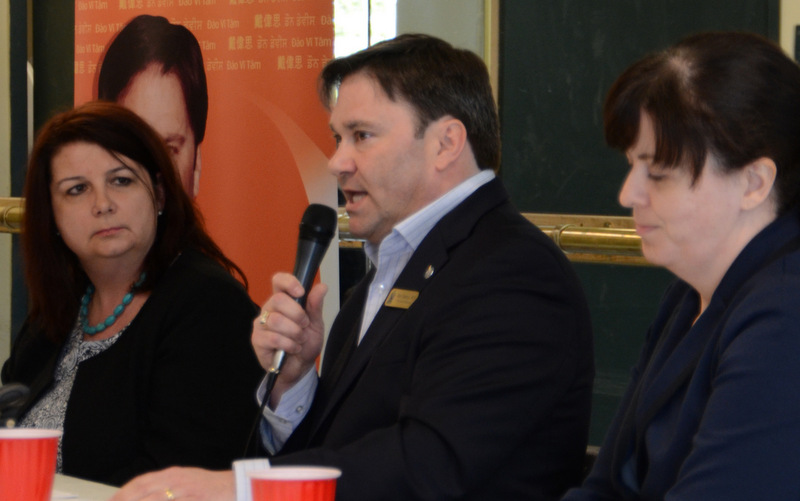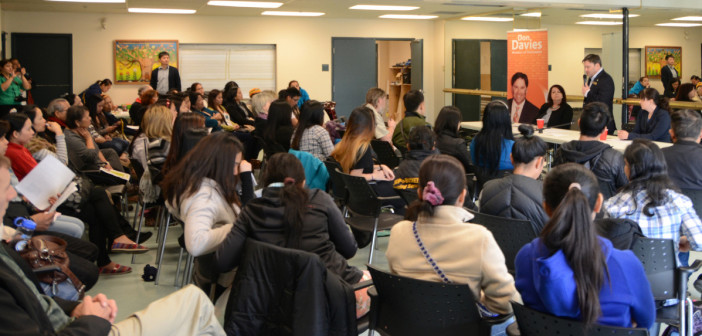Vancouver Kingsway MP Don Davies has proposed a 5-point action plan to address the recent controversial changes to the Live-in Caregiver Program (LCP). It will be introduced once a National Democrat Party (NDP) government is formed.
“The real problem in LCP can be addressed by a federal government who has the will to do so,” Davies said in the town hall meeting held recently at the Collingwood Neighborhood House.
Davies strongly disagrees with the Conservative government’s criticism of LCP being an inappropriate reunification program.
In the town hall meeting, Davies outlined his proposed plan:
- Caregivers should be granted Permanent Residency immediately upon arrival in Canada, or within the first 12 months
- Spouses and children should be able to come to Canada immediately with the caregiver, and work permits should be granted to eligible family members so that everyone in the family has a chance to contribute income
- Caregivers should have the option of living outside the home and with their own family if they choose to do so
- Only one medical exam should be required not only for the caregiver, but also for their spouse and family, to be completed prior to coming to Canada
- The Conservative imposed caps on Permanent Residency visas for caregivers and the requirement for one year of post-secondary education should be removed.
Executive Director Natalie Drolet of West Coast Domestic Workers Association said that the recent changes in LCP essentially abolished the program.
The changes implemented by the federal government are very significant as it pushed for temporary migration rather than permanent migration said Drolet. It means that all incoming caregivers are affected by the “four-in, four-out” rule as well.
“As of November 30, 2014, there will be no new entry in the live in caregiver program. Those caregivers who are already in Canada are subject to continue to the existing rule at that time and will be grand fathered in. The caregivers who want to come to Canada have to apply for work permit through the temporary foreign work program.” Drolet said.
The new program called In-Home Caregiver gives two pathways to permanent residency – caring for children and caring for people with high medical need or elderly. As there are additional requirements to meet, Drolet explained that the recent changes take away the right of the caregiver to apply for permanent residency once they meet the 24 months requirement within 4 years.

Live-in Caregiver Town Hall with (left to right) Manuela Gruber Hersch, Association of Caregivers and Nanny Agencies in Canada, Don Davies, MP and Natalie Drolet, West Coast Domestic Workers Association. Photo by Bert Morelos.
The more onerous requirements are the additional medical exam, proof of English proficiency and the higher educational benchmark. There is also a cap of 2,750 applicants each year per pathway. In total, only 5,500 applicants for permanent residence will be processed.
“The cap means there is no guarantee that the caregivers applications PR application will be processed even though she meets all the requirement to apply for permanent residency. It also means the lower skilled at home caregivers will be competing with other high-skilled caregivers who work in the hospital and who will potentially apply for PR as well.” Drolet said.
With the recent changes, the federal government has promised six months processing time for PR application. In addition, the employer can no longer charge for board and lodging if the caregiver is living with them. Employers are also required to pay the prevailing wage for the occupation.
“All of which are positive but the overall changes impact the low skilled occupation. It puts the caregiver in an increasingly vulnerable and precarious position. We see a lot of employer’s abusive standard like long working hours, unpaid overtime and we feel that adding caps will exacerbate the vulnerability to abuse,” Drolet emphasized.
From the employer side, Manuela Gruber Hersch, president of the Association of Caregivers and Nanny Agencies in Canada likewise lambasted the recent changes in the program.
“We understand that caregiver is asking for fare wages but most of the employing families find it really costly. Hiring a caregiver would only allow them to get a 2-year work permit. After 2 years, they have to pay another $1,000 work permit fee if the caregiver agrees to stay for another 2 years. The employer is likewise required to pay for the return airfare should the caregiver not extend her stay.” Gruber Hersch said.
Gruber Hersch further explained that should the caregiver leaves an employer for any valid reason, the caregiver will have to wait for 6 months for the new work permit to be issued again. An employment certificate will also be required for submission as well as pass the second medical exam.
The town hall meeting was attended by current and former caregivers and employing families who are interested in the program.
Davies said that the Conservative government failed to address the core deficiencies. “Rather than improving the situation for both families and caregivers, the new program makes it slower, more complicated and expensive for families, and less responsive to the needs of caregivers themselves.” Davies concluded.




